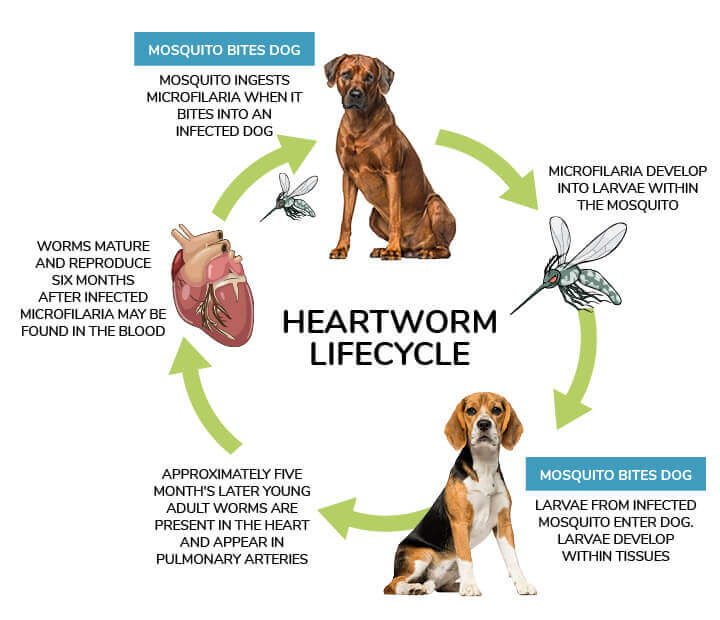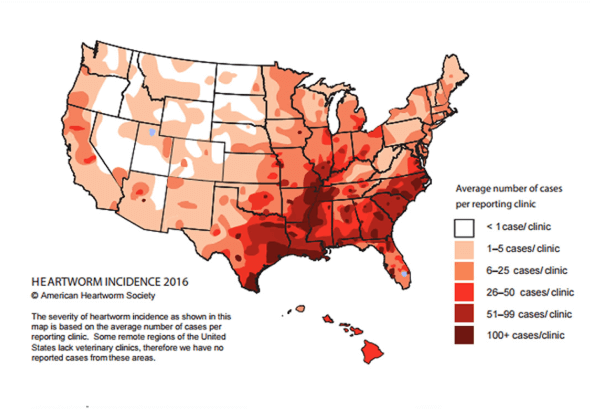What causes heartworm disease?
Heartworm disease is caused by a blood-borne parasite, Dirofilaria immitis. This parasite is transmitted by mosquitoes and can cause life-threatening illness. Adult heartworms live in the right side of the heart and the pulmonary artery. They can cause physical damage to the heart, significant inflammation in the lungs, and can cause damage to other organs such as the kidneys. Female adult heartworms can be between 6 to 14 inches long and can live up to 5 years.
 Heartworm Life Cycle
Heartworm Life Cycle
- Infected dogs in the community are the source of microfilaria, “baby” heartworms that are circulating in their bloodstream. When a mosquito bites an infected dog, microfilaria are transferred to the mosquito.
- Microfilaria develop into larva in the mosquito
- When a mosquito carrying infective larva bites a dog, those larvae are transmitted into that dog’s tissues. Larva migrates through the tissues until eventually reaching the heart as adult worms.
- This takes about 5 to 6 months. Adult worms in the heart reproduce and release microfilaria into the bloodstream.
Heartworms must go through the mosquito to complete their life cycle, so they cannot be spread directly from dog to dog. However, an infected dog acts as a reservoir and a potential source of infection for other dogs who live nearby. Since mosquitoes can easily get indoors, it is important to remember that even dogs who spend most of their time inside are at risk of exposure to heartworms.
How do heartworms affect my dog?
Adult heartworms live in the right side of the heart and the pulmonary artery. They can clog the heart and pulmonary artery, reducing blood flow to the kidneys, lungs, and other vital organs. They can cause damage to the valves within the heart, decreasing the heart’s ability to function and ultimately leading to heart failure. The body’s inflammatory response to the worms can also create significant inflammation within the lungs, leading to coughing, shortness of breath, and in severe cases pulmonary embolism. Dogs with early stages of heartworm disease often show no symptoms, which is why annual testing is so important. Dogs with more advanced disease or heavier worm burdens may have a soft, dry cough. They may also be less active, pant even at rest, or be weak. Your veterinarian may detect a heart murmur. Severe cases may develop heart failure, and owners may notice a distended abdomen caused by fluid accumulation or even sudden collapse.
Testing for heartworm disease
All dogs should be tested annually for heartworm disease, even dogs who regularly take heartworm prevention. The heartworm test is typically performed during a routine wellness screen and takes just a few drops of blood. This test detects the presence of adult worms, which take 5 to 6 months to develop after initial infection, so it is not performed in puppies under 6 months of age. If an initial screening test is positive for heartworms, your veterinarian will recommend additional follow up testing. This may include checking blood for microfilaria (baby heartworms visible under a microscope) or sending out other tests to confirm the positive result.
Heartworm Staging
There are 4 stages of heartworm disease. Dogs with a Stage One heartworm infection typically have no clinical symptoms, whereas dogs with a Stage Four infection may have severe systemic illness. If your pet is diagnosed with heartworm disease your veterinarian will recommend additional testing to identify which stage the infection is in, which will help guide treatment. This additional testing will likely include a comprehensive blood panel, urine testing, and chest x-rays. Treating for Heartworms Heartworm treatment protocols are very effective, especially when disease is detected early. Due to the location of heartworms within the heart and pulmonary arteries, there is some risk involved with treatment, although fatalities are rare. Dogs with advanced stages of infection are at higher risk of suffering from side effects. Heartworm treatment is a 3 to 5 month long process, depending on the protocol your veterinarian chooses. It requires multiple hospital visits, and patients are hospitalized during the injection phases. Throughout the entire treatment, the dog’s activity has to be severely restricted to avoid side effects. The drug used to kill the adult heartworms is highly specialized and expensive, and the average the cost of treating a dog for heartworms far exceeds the cost of a lifetime of heartworm prevention.
How do I protect my pet from heartworms?
There are many different products available for heartworm protection. Georgia Veterinary Associates primarily recommends Sentinel and Heartgard, which are chewable tablets given every 30 days. These products are also labeled to protect dogs against a variety of intestinal parasites. An injectable medication called ProHeart 6 is also available, which prevents heartworms for 6 months. ProHeart does not protect against most intestinal parasites, so is typically only recommended for dogs when monthly dosing of a chewable product is not feasible for some reason. Heartworm prevention is extremely effective when given as prescribed, but it is very important that it is given EVERY 30 DAYS.
 Heartworm prevention should be given all-year-round since mosquitoes carrying heartworms persist in our area even in the winter. For many people, a monthly recurring smartphone reminder is a helpful way to remember.
Heartworm prevention should be given all-year-round since mosquitoes carrying heartworms persist in our area even in the winter. For many people, a monthly recurring smartphone reminder is a helpful way to remember.
For more resources on heartworm disease visit: https://www.heartwormsociety.org/pet-owner-resources
Due to the high rate of heartworm infection in our area, monthly prevention and annual testing is crucial for all dogs.
For a downloadable PDF version of our Heartworm Disease handout, click here.
